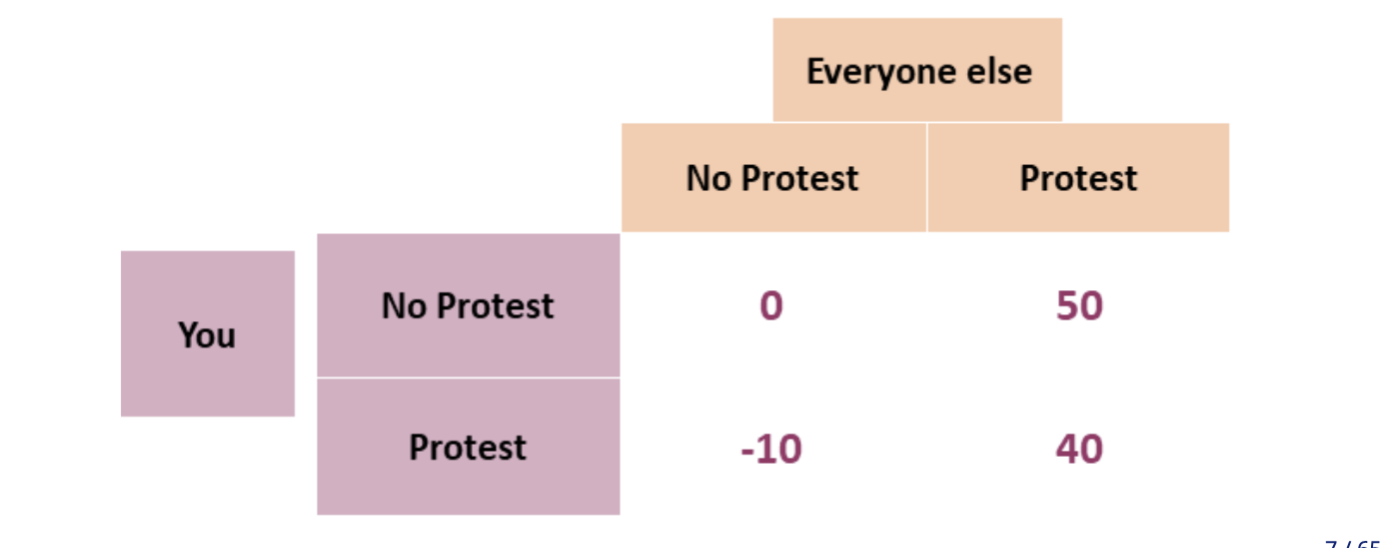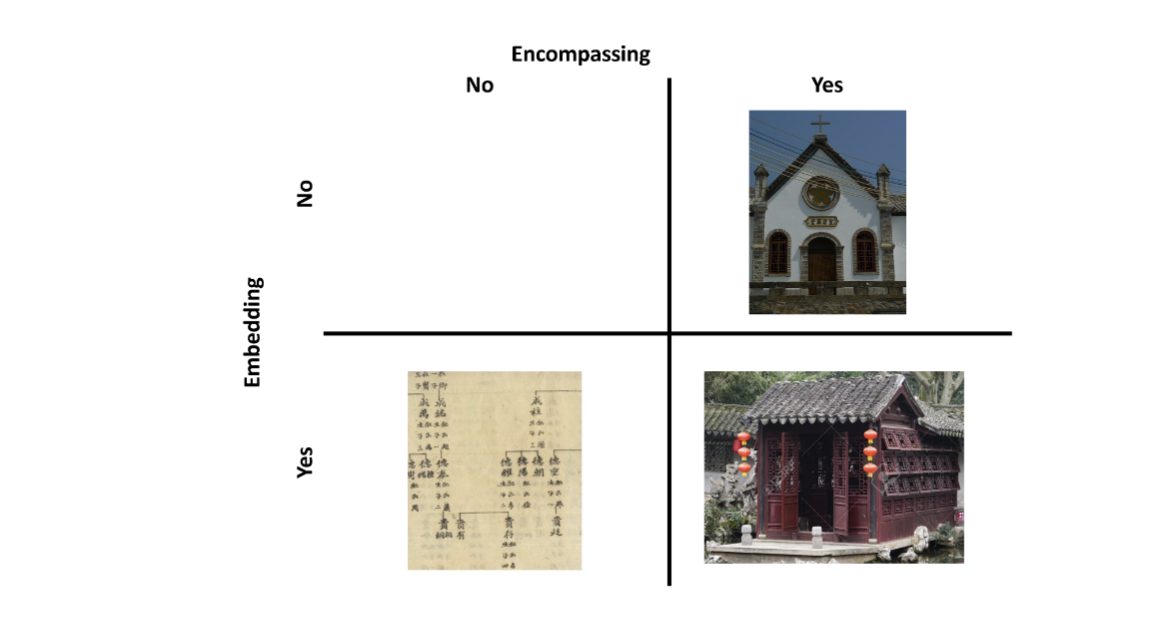class 11 collective action
1/16
There's no tags or description
Looks like no tags are added yet.
Name | Mastery | Learn | Test | Matching | Spaced |
|---|
No study sessions yet.
17 Terms
1. Collective Action
why bother to do collective action if you will also benefit from it?
for example you dont need to pay the cost of attending a protest

not protesting is the best response if others protest
problem in societies
but if no one protests you get nothing
Definition: Free-Riding
definition: Each person can benefit without contributing
"The maximization of short-term self-interest yields outcomes leaving all participants worse off"
Rationally, no-one contributes!
Free-riding prevents cooperation
1. Collective Action
Public goods always generate free-riding problems
By definition, the benefits are non-excludable
also non rival
Each person can benefit without contributing
Defence, infrastructure, public health, property rights
Climate change mitigation
ppl want to free ride
Electoral Accountability
millions need to vote against them
what if they are handing out money? we have to pout aside our short term interests
Social Accountability
Collective Action: rational behavior
Rational behaviour: DO NOT cooperate
The paradox of collective action: People are too cooperative in practice!
people are way too irrationally cooperative
we achieve collective action problem despite the free rider problem
In lab experiments, cooperation rates are 20-50%, not 0% (Sally 1995)
People do protest in large numbers(sometimes)
Voters do kick out bad leaders (sometimes
Definition: Collective Action
Multiple people coordinating their actions to overcome a free-riding problem and secure a collective benefit
how do we override the free rider problem?
Collective action is easier where:
1. The group is smaller
Communication and monitoring is easier
2. Coercion is used
Taxation solves many public goods problems
thats how we pay for public goods
3. Selective incentives are used
Handing out t-shirts, food, money to participants
Entertainment
you get the benefit if you put in the work
4. Informal Institutions: Social norms
Where there are repeated interactions
And social costs to not participating
Voting as a duty
Community clean-up day
most common*
2. Improving Accountability with Collective Action
Anti-corruption projects try to increase accountability
Most African countries have 'very strong' anti-corruption laws (Global Integrity 2008)
But increased monitoring, or stricter punishment does not increase enforcement
the problem isnt the written rules- its alrdy there its abt the enforcement of these rules
the problem is the principle to hold ppl accountable
anti corruption methods wont work if the principle doesnt have a incentive
Because each Principal does not do their job:
Bureaucrats look the other way to protect their job
Politicians steal to finance elections
Voters prioritize ethnicity, clientelism over voting out bad leader
voters say they dont want it but rlly sometimes arent prioritizing accountability because they also want the benefit
Question: Accountability projects often fail to stop corruption. How might a collective action approach to tackling corruption work?
donor western liberal response
to monitor people and punish them
(doesn’t rlly work)
Free-riding in reporting and punishing corruption
Monitoring and reporting is costly
bcuz you deny or undermine the system
you’ll get judged
Less corruption benefits everyone in society (a public good, making investment safer)
Stricter enforcement does not help because corruption is the norm
An informal institution ('culture') of corruption:
“Well, if everybody seems corrupt, why shouldn’t I be corrupt.” (Myrdal 1968)
"If I don’t take it, it is going to be taken by somebody else" (Persson et al 2012)
Even worse, being honest can bring social punishment and shaming
"If you have an office but have not stolen—if you have not helped your family—they are actuallygoing to curse you
" (Persson et al 2012)"[People do not report because]... they fear losing their jobs...The reporting system is corrupt itself.(Persson et al 2012)
Failed anti-corruption reforms just create more cynicism and stronger expectations that corruption willcontinue (Collier 2000)26 / 65
2. Improving Accountability with Collective Action
John Githongo, Permanent Secretary in charge of
Governance and Ethics, Kenya, 2003-2005
Reported the Anglo-Leasing corruption scandal
Allegedly received death threats from the head of Kenya's Anti-Corruption Commission
Fled the country
Everyone wants a less corrupt society
But no individual's action can take us there
Being corrupt is rational when everyone elseis corrupt
What's the alternative?
We need to change social norms and expectations
Informal Institutions!
So people want to sanction others for wrong-doing
2. Improving Accountability with Collective Action
Norms against corruption strengthen accountability
Bureaucrats get respect for blowing the whistle
Judges reject bribes to maintain social status as 'clean'
Voters see their role as punishing corrupt politicians (Brazil, not India)
Citizens collectively protest against badservices to be a part of the communit
How do we get accountability under authoritarianism - where judges are not independent, there are no elections and citizens have few social rights? Eg. China?
Informal Accountability': Local elites face social sanctions if they fail to deliver public goods (Tsai 2007)
not through formal structures but through pre-existing social groups
And 'moral standing' rewards where they perform well
socially judged
Eg. Party Secretary named on the donor wall in the temple
Where there are village temples, investment rises from 61 to 99 yuan per person
Solidary groups are civil society groups that are:
1. Embedding - politicians and bureaucrats are members
So politicians can be rewarded
2. Encompassing - the group covers the whole political community
So politicians are incentivized to provide public goods to all

= village temples means politicians and everybody is a member
in the absence of democracy they still manage to extract performance and hold them accountable at the village temple
3. Development as Collective Action
Why is maternal mortality improving faster in Rwanda than in Malawi, Uganda or Niger?
The institutional rules and policies are the same across countries
Rwanda
All four countries tried to improve accountability using the Principal-Agent model:
Making Traditional Birth Attendants illegal
Performance bonuses for health workers
'Health monitoring' units
Fines for failing to give birth at a clinic'
Voluntary Health Committees' to supervise clinics
These accountability mechanisms only worked in Rwanda
1) 'Imihigo' public pledges by the President and Mayors
Breaking a pledge lets down your community
Checking on progress is a citizen's obligation
embedded in the social practices they were used too
western accountability mechanisms were ignored
2) 'Ubudehe' self-help to solve local problems
Reliance on outsiders is lazy
3) 'Umuganda' communal work
Rude not to participate
You expect others to participate
niger
The state provided ambulances but still no fuel or drivers
Nurses still unmotivated as they were appointed by patronage
Nobody cleans up the clinics
NO Collective Action for development
3. Development as Collective Action
Rwanda used collective action to make accountability mechanisms work
Traditional informal institutions and social norms stopped free-riding
Development as a Principal-Agent Problem
The objectives of actors are in conflict
We have to incentivize some people to change their behaviour
We need to generate accountability
strong men holding ppl accountable
Development as a Collective Action Problem
The objectives of actors are the same
The context prevents them realizing these objectives - they are stuck in a trap
We need to help people coordinate
were all trapped and under pressure to be corrupt
how do we coordinate to get out to change at the same time?
4. Shifting Equilibria
From a Prisoner's Dilemma to an Assurance
what do your choices depend on?
your expectations on how ppl coordinate
the challenge is to get social norms to move us out of this bad equilibrium
How do we encourage people to pay taxes without just threatening more punishment?
Nigerian cities have very different levels of 'taxmorale'
they don’t pay for taxes
Different equilibriua
how did this change?
they wanted more revenue from there own domestic industry and not only oil
Lagos state government started delivering public services first
Raising trust in government
Raising expectations others are paying taxes
Public service delivery created a norm of tax payment'
Policy feedback': Creating a social contract
ex: lagos starts putting flower and cleaning waste so ppl starting paying taxes
How can we shift equilibria?
Build on latent social norms and traditional institutions, eg. 'Imihigo' in Rwanda
'Deliver first' to build a new social contract
you need to change norms
Lead from the top to change expectations
Use shocks/events as opportunities
More than just sharing factual information with individuals:
Make information public and common knowledge
Information about what others' think/expect, eg. in Saudi Arabia attitudes to women are more progressive than people think others' attitudes are
you need to change peoples expectations and make them think the rest of society is also changing
we can do this by making ingo public.. people who see these adverts know others are also paying it
Conclusion
1. Collective Action
Achieving collective gains means overcoming free-riding
By selective incentives, coercion or social norms
2. Improving Accountability with Collective Action
Corruption persists because everyone else is corrupt; it's costly and futile to be honest
Reporting and punishing corruption as a social normInformal accountability through solidary groups increases investment
3. Development as Collective Action
Traditional social norms can encourage collective action for investment, eg. 'Imihigo' in Rwanda
4. Shifting Equilibria
Switching to a 'pro-development' equilibrium means changing expectations and social norm